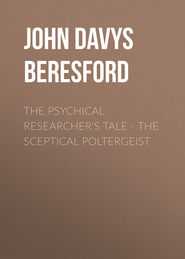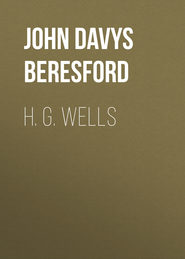По всем вопросам обращайтесь на: info@litportal.ru
(©) 2003-2024.
✖
The Wonder
Настройки чтения
Размер шрифта
Высота строк
Поля
"I mean, have you had a doctor for him?"
The train was slackening speed.
"Oh! yes, sir."
"And what do they say?"
The child turned its head and looked the rubicund man full in the eyes. Never in the face of any man or woman have I seen such an expression of sublime pity and contempt....
I remembered a small urchin I had once seen at the Zoological Gardens. Urged on by a band of other urchins, he was throwing pebbles at a great lion that lolled, finely indifferent, on the floor of its playground. Closer crept the urchin; he grew splendidly bold; he threw larger and larger pebbles, until the lion rose suddenly with a roar, and dashed fiercely down to the bars of its cage.
I thought of that urchin's scared, shrieking face now, as the rubicund man leant quickly back into his corner.
Yet that was not all, for the infant, satisfied, perhaps, with its victim's ignominy, turned and looked at me with a cynical smile. I was, as it were, taken into its confidence. I felt flattered, undeservedly yet enormously flattered. I blushed, I may have simpered.
The train drew up in Great Hittenden station.
The woman gathered her priceless possession carefully into her arms, and the rubicund man adroitly opened the door for her.
"Good day, sir," she said, as she got out.
"Good day," echoed the rubicund man with relief, and we all drew a deep breath of relief with him in concert, as though we had just witnessed the safe descent of some over-daring aviator.
IV
As the train moved on, we six, who had been fellow-passengers for some thirty or forty minutes before the woman had entered our compartment, we who had not till then exchanged a word, broke suddenly into general conversation.
"Water on the brain; I don't care what any one says," asserted the rubicund man.
"My sister had one very similar," put in the failure, who was sitting next to me. "It died," he added, by way of giving point to his instance.
"Ought not to exhibit freaks like that in public," said an old man opposite to me.
"You're right, sir," was the verdict of the artisan, and he spat carefully and scraped his boot on the floor; "them things ought to be kep' private."
"Mad, of course, that's to say imbecile," repeated the rubicund man.
"Horrid head he'd got," said the failure, and shivered histrionically.
They continued to demonstrate their contempt for the infant by many asseverations. The reaction grew. They were all bold now, and all wanted to speak. They spoke as the survivors from some common peril; they were increasingly anxious to demonstrate that they had never suffered intimidation, and in their relief they were anxious to laugh at the thing which had for a time subdued them. But they never named it as a cause for fear. Their speech was merely innuendo.
At the last, however, I caught an echo of the true feeling.
It was the rubicund man who, most daring during the crisis, was now bold enough to admit curiosity.
"What's your opinion, sir?" he said to me. The train was running into Wenderby; he was preparing to get out; he leaned forward, his fingers on the handle of the door.
I was embarrassed. Why had I been singled out by the child? I had taken no part in the recent interjectory conversation. Was this a consequence of the notice that had been paid to me?
"I?" I stammered, and then reverted to the rubicund man's original phrase, "It—it was certainly a very remarkable child," I said.
The rubicund man nodded and pursed his lips. "Very," he muttered as he alighted, "Very remarkable. Well, good day to you."
I returned to my book, and was surprised to find that my index finger was still marking the place at which I had been interrupted some fifteen minutes before. My arm felt stiff and cramped.
I read: "… and if this ray be removed, the bare direction or the empty place would alone be indicated."
CHAPTER II
NOTES FOR A BIOGRAPHY OF GINGER STOTT
I
Ginger Stott is a name that was once as well known as any in England. Stott has been the subject of leading articles in every daily paper; his life has been written by an able journalist who interviewed Stott himself, during ten crowded minutes, and filled three hundred pages with details, seventy per cent. of which were taken from the journals, and the remainder supplied by a brilliant imagination. Ten years ago Ginger Stott was on a pinnacle, there was a Stott vogue. You found his name at the bottom of signed articles written by members of the editorial staff; you bought Stott collars, although Stott himself did not wear collars; there was a Stott waltz, which is occasionally hummed by clerks, and whistled by errand-boys to this day; there was a periodical which lived for ten months, entitled Ginger Stott's Weekly; in brief, during one summer there was a Stott apotheosis.
But that was ten years ago, and the rising generation has almost forgotten the once well-known name. One rarely sees him mentioned in the morning paper now, and then it is but the briefest reference; some such note as this "Pickering was at the top of his form, recalling the finest achievements of Ginger Stott at his best," or "Flack is a magnificent find for Kent: he promises to completely surpass the historic feats of Ginger Stott." These journalistic superlatives only irritate those who remember the performances referred to. We who watched the man's career know that Pickering and Flack are but tyros compared to Stott; we know that none of his successors has challenged comparison with him. He was a meteor that blazed across the sky, and if he ever has a true successor, such stars as Pickering and Flack will shine pale and dim in comparison.
It makes one feel suddenly old to recall that great matinée at the Lyceum, given for Ginger Stott's benefit after he met with his accident. In ten years so many great figures in that world have died or fallen into obscurity. I can count on my fingers the number of those who were then, and are still, in the forefront of popularity. Of the others poor Captain Wallis, for instance, is dead—and no modern writer, in my opinion, can equal the brilliant descriptiveness of Wallis's articles in the Daily Post. Bobby Maisefield, again, Stott's colleague, is a martyr to rheumatism, and keeps a shop in Ailesworth, the scene of so many of his triumphs. What a list one might make, but how uselessly. It is enough to note how many names have dropped out, how many others are the names of those we now speak of as veterans. In ten years! It certainly makes one feel old.
II
No apology is needed for telling again the story of Stott's career. Certain details will still be familiar, it is true, the historic details that can never be forgotten while cricket holds place as our national game. But there are many facts of Stott's life familiar to me, which have never been made public property. If I must repeat that which is known, I can give the known a new setting; perhaps a new value.
He came of mixed races. His mother was pure Welsh, his father a Yorkshire collier; but when Ginger was nine years old his father died, and Mrs. Stott came to live in Ailesworth where she had immigrant relations, and it was there that she set up the little paper-shop, the business by which she maintained herself and her boy. That shop is still in existence, and the name has not been altered. You may find it in the little street that runs off the market place, going down towards the Borstal Institution.
There are many people alive in Ailesworth to-day who can remember the sturdy, freckled, sandy-haired boy who used to go round with the morning and evening papers; the boy who was to change the fortunes of a county.
Ginger was phenomenally thorough in all he undertook. It was one of the secrets of his success. It was this thoroughness that kept him engaged in his mother's little business until he was seventeen. Up to that age he never found time for cricket—sufficient evidence of his remarkable and most unusual qualities.
It was sheer chance, apparently, that determined his choice of a career.
He had walked into Stoke-Underhill to deliver a parcel, and on his way back his attention was arrested by the sight of a line of vehicles drawn up to the boarded fencing that encloses the Ailesworth County Ground. The occupants of these vehicles were standing up, struggling to catch a sight of the match that was being played behind the screen erected to shut out non-paying sightseers. Among the horses' feet, squirming between the spokes of wheels, utterly regardless of all injury, small boys glued their eyes to knot-holes in the fence, while others climbed surreptitiously, and for the most part unobserved, on to the backs of tradesmen's carts. All these individuals were in a state of tremendous excitement, and even the policeman whose duty it was to move them on, was so engrossed in watching the game that he had disappeared inside the turnstile, and had given the outside spectators full opportunity for eleemosynary enjoyment.
That tarred fence has since been raised some six feet, and now encloses a wider sweep of ground—alterations that may be classed among the minor revolutions effected by the genius of the thick-set, fair-haired youth of seventeen, who paused on that early September afternoon to wonder what all the fuss was about. The Ailesworth County Ground was not famous in those days; not then was accommodation needed for thirty thousand spectators, drawn from every county in England to witness the unparallelled.
Ginger stopped. The interest of the spectacle pierced his absorption in the business he had in hand. Such a thing was almost unprecedented.
"What's up?" he asked of Puggy Phillips.
Puggy Phillips—hazarding his life by standing on the shiny, slightly curved top of his butcher's cart—made no appropriate answer. "Yah—ah—ah!" he screamed in ecstasy. "Oh! played! Pla-a-a-ayed!!"
Ginger wasted no more breath, but laid hold of the little brass rail that encircled Puggy's platform, and with a sudden hoist that lifted the shafts and startled the pony, raised himself to the level of a spectator.
"'Ere!" shouted the swaying, tottering Puggy. "What the … are yer rup to?"
The well-drilled pony, however, settled down again quietly to maintain his end of the see-saw, and, finding himself still able to preserve his equilibrium, Puggy instantly forgot the presence of the intruder.
"What's up?" asked Ginger again.








